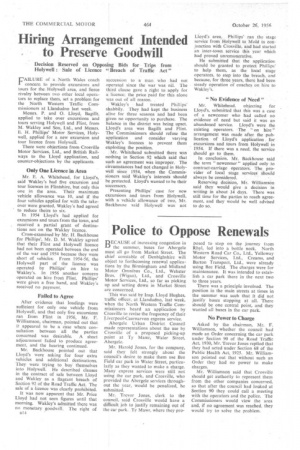Police to Oppose Renewals
Page 48

If you've noticed an error in this article please click here to report it so we can fix it.
BECAUSE of increasing congestion in the summer, buses for Abergele must all go from Market Street. The chief constable of Denbighshire will object to forthcoming renewal applications by the Birmingham and Midland Motor Omnibus Co.,. Ltd., Webster Bros. (Wigan), Ltd., and Crosville Motor Services, Ltd., so far as picking up and setting down in Market Street arc concerned.
This was said by Insp. Lloyd Hughes, traffic officer, at Llandudno, last week, when the North Western Traffic Commissioners heard an application by Crosville to revise the frequency of their Liverpool-Caernarvon express service.
Abergele Urban District Council made representations about the use by Crosville of a proposed picking-up point at Ty Mawr, Water Street, Abergele.
Mr. Harold Jones, for the company, said they felt strongly about the council's desire to make them use Bee Field car park in Water Street, particularly as they wanted to make a charge. Many express services were still not using the car park, and Crosville, who provided the Abergele services throughout the year, would be penalized, he submitted.
Mr. Trevor Jones, clerk to the council, said Crosville would have a difficult job to justify remaining out of the car park. Ty Mawr, where they pro posed to stop on the journey from Rhyl, led into a bottle neck. North Western Road Car Co., Ltd., Yelloway Motor Services, Ltd., Creams, and Barton Transport, Ltd., were already using Bee Field. The charges were for maintenance. It was intended to establish a car park there in the next two to three years.
There was a principle involved. The position in the main streets at times in the summer was such that it did not justify buses stopping at all. There should be one central point, and they wanted all buses in the car park.
No Power to Charge
Asked by the chairman, Mr. F. Williamson, whether the council had made an Order concerning the car park under Section 90 of the Road Traffic Act, 1930, Mr. Trevor Jones replied that they had acted under Section 68 of the Public Health Act, 1925. Mr. Williamson pointed out that without such an Order they had no power to make charges.
Mr. Williamson said that Crosville should get authority to represent them from the other companies concerned, so that after the council had looked at Section 90 they could call a meeting with the operators and the police. The Commissioners would view the area and, if no agreement was reached, they would try to solve the problem.




































































































